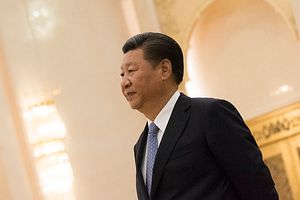It was one of the most famous and oft repeated stories from the Maoist period – the tale of the old man and the mountains. In Mao’s rendition, the foolish old man, as the Great Helmsman called him, had the view from his house ruined by two mountains standing in front. So he decided to remove them. He got buckets and started the seemingly eternal task of shifting the mountains bit by bit. This attracted the mockery of his neighbors, who said he was engaged in a hopeless task. The old man’s retort is one of the most famous lines in Communist Party propaganda: “If I don’t remove it, then my children will, and if not them, then my children’s children, and my grandchildren’s children.” The tale concludes, somewhat oddly for something being told by a believer in Marxism-Leninism, with the appearance of a compassionate god who, moved by the old man’s faith, simply magics the mountains away.
The Maoist interpretation of this parable was explicitly given in the conclusion. China labored under two great burdens, akin to the mountains: feudalism and imperialism. Feudalism was a domestic issue – the modern China’s entrapment in its own complex, Confucianist past. Imperialism dealt with the outside world, and the ways that industrialized countries with superior technology had been able to come to China and exploit and manipulate it.
The China of Xi Jinping can safely say that with the creation of the primary stage of socialism, as they call it in internal political discourse, feudalism and imperialism have gone. Maoist class struggle, and then the implementation of a socialist market system have dealt a death blow to the first. The conversion of economic power into diplomatic and military strength have dealt with the second. The message from Xi at the 19th Party Congress in October was clear: We are proud, we are strong, and we won’t ever be pushed around again. More importantly, China has the hard naval and military and economic kit to ensure this doesn’t happen. It is more an acknowledgement of success rather than criticism in this context, but now it is China that stands accused of interfering in other countries, through outward investment and use of its trade links for political ends. That is a 180-degree change from 70 years ago, when the People’s Republic was just being created.
There are still mountains, in terms of vast challenges, in China, however, and sometimes it looks like a miracle akin to the appearance of a helpful god might be necessary to deal with them. The first, in terms of domestic issues, is the creation of a social welfare and pension system that deals with the country’s striking demographic changes and some of the more negative side effects of rapid development and growth. China has an aging population, one starting to suffer from the epidemic of chronic long-term illnesses like heart disease and cancers. China is also a place where inequality is rampant.
By any measure these are formidable problems to face. They are even more formidable in view of the speed with which the Chinese government is trying to handle them. Somehow in the next few years it will need to construct a health care service and pension system for a country where the old will increasingly outnumber the young. China’s leaders will not be helped by the rising expectations of the new middle class, who will prove impatient if they feel they are getting a poor deal. For them, lectures about sacrifice and endurance, which worked in the Maoist past, will no longer suffice. People want the China dream here, and they want it now, whether it is delivered by socialism with Chinese characteristics or not.
The second great mountain, which straddles domestic and international space, is China’s battle with its own environment. Xi talked of an ecological country. So too did his immediate predecessor Hu Jintao. The 12th Five Year Plan from 2011, and the 13th from last year, had a great deal of content related to carbon emissions, and managing China’s water, air, and resource problems. Under Xi, China has become proactive in forcing compliance for companies in this area, and signed the Paris Convention in late 2015. Since Donald Trump’s announcement that the United States would withdraw from this accord, China has increasingly occupied a leadership position, saying it will still stand by its commitments. Despite all this, China’s cities remain blighted by poor quality air, the Tibetan ice caps continue to melt, and water is overwhelmingly polluted. The China Dream partly promised a living environment with clean skies, good air, and sustainability at its heart. But as of 2017, this remains an aspiration, dependent on gamechanging new technology rather than anything that exists at the moment to bring it about.
The recent focus on China has been on its rising global status and its strength. It is true that China’s international position has changed in the last five years. But its challenges in the realm of managing domestic social issues and environmental ones have grown no less severe in the time since Xi came to power. In fact, the pressure is on more than ever to have solutions. But the solutions don’t look like they are appearing as fast as they should.
Mao Zedong could promise people removal of the two great mountains of feudalism and imperialism one day, in the distant future. But Xi needs the mountains of social issues and environment to be solved today. Let’s hope some benign god comes along to offer a helping hand.

































